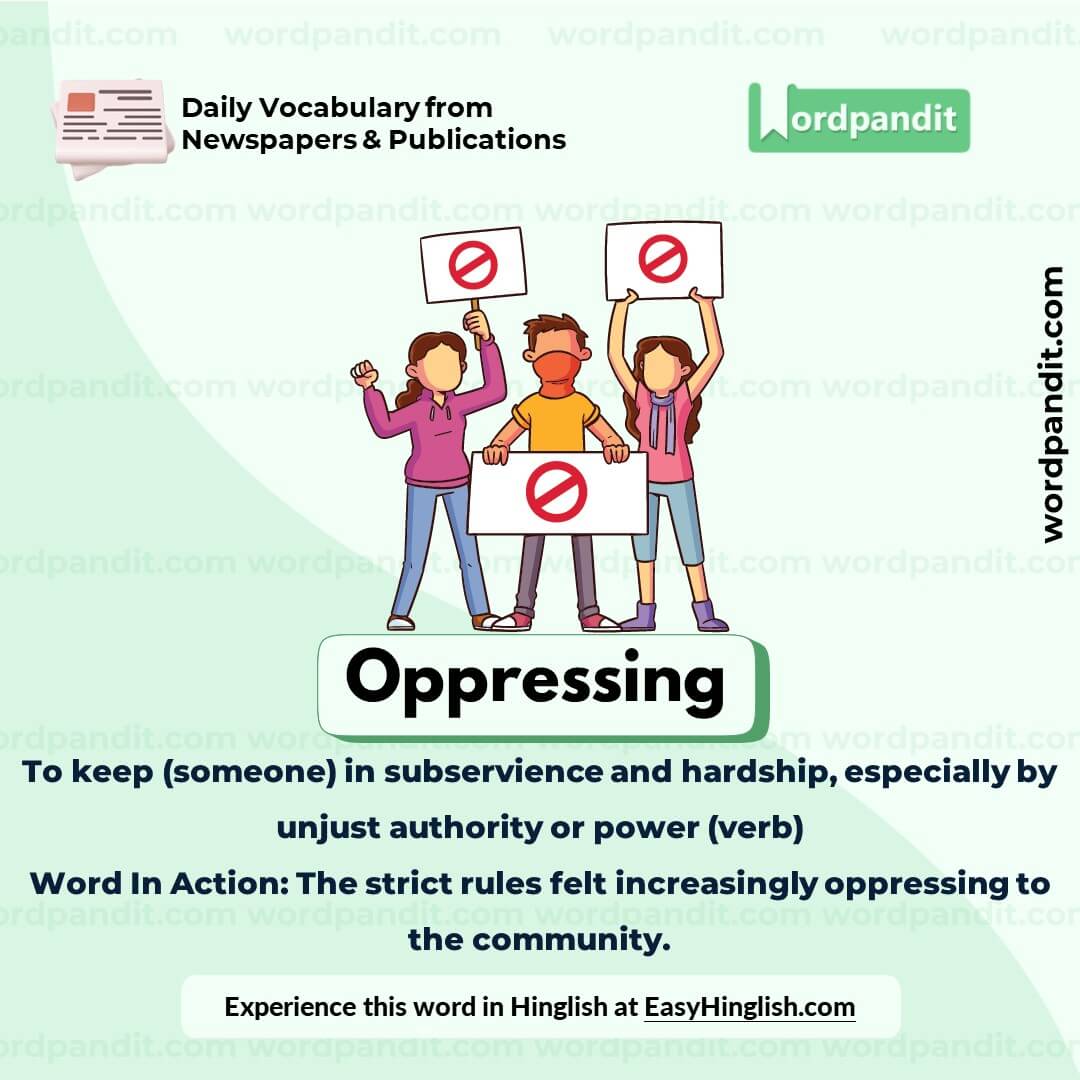Daily Vocabulary from Indian Newspapers and Publications
Welcome to Wordpandit’s Indian Vocabulary Hub
At Wordpandit, we understand the importance of staying rooted in the local context while expanding your language skills. This section focuses on enriching your vocabulary with words and phrases drawn from India’s leading newspapers and publications, ensuring you're learning vocabulary that is practical, relevant, and uniquely Indian.
Why Indian Sources Matter
We believe that the best way to master any language is by immersing yourself in local content. That’s why we carefully curate vocabulary from top Indian publications, including:
- The Hindu
- The Times of India
- The Economic Times
- Hindustan Times
- Live Mint
- The Indian Express
- And many others...
Stay Updated, Stay Relevant
With daily updates from Indian news sources, you’ll be consistently learning words that reflect the trends and shifts in Indian society and culture. Our focus is to provide vocabulary that enhances your understanding of the language in an Indian context.
How Wordpandit Supports Your Goals
Whether you’re preparing for exams, aiming to improve your professional communication, or simply want to stay connected with the latest Indian vocabulary, Wordpandit is here to guide you every step of the way.
Learn with a Practical Approach
Our interactive learning methodology includes real-world examples, engaging activities, and context-specific usage to ensure that every word becomes part of your active vocabulary.
Dive into Indian Vocabulary Today!
Why Choose Wordpandit?
Practical Learning: Focus on words you'll actually encounter in real-world reading, enhancing your comprehension and communication skills.
Diverse Content: From current affairs to scientific breakthroughs, our varied sources expose you to vocabulary across multiple domains.
Effortless Integration: Make Wordpandit a part of your daily routine. Just a few minutes each day can significantly boost your lexicon over time.
Your Path to Vocabulary Mastery
- Visit our Daily Vocabulary section regularly
- Explore new words and their usage in context
- Practice incorporating these words into your own writing and speech
- Track your progress as your vocabulary expands
Start Your Journey Today
Embark on your vocabulary enhancement journey with Wordpandit. By consistently engaging with our daily posts, you'll build a robust vocabulary that serves you well in academic, professional, and personal contexts.
Remember, a word a day keeps linguistic limitations at bay. Make Wordpandit your daily companion in the quest for vocabulary excellence!
WORD-1: Rigorous
Context:
"To navigate these challenges, India must enforce rigorous protocols to verify the authenticity of generated carbon credits." - The Hindu
Explanatory Paragraph:
The word rigorous describes something that is extremely thorough, strict, and accurate. It is often used in contexts where high standards are necessary, such as in testing, verification, or protocols, to ensure that no errors or exceptions are allowed. For example, "rigorous protocols" would mean methods that leave no room for error or oversight.
Meaning: Extremely thorough, exhaustive, or accurate (adjective)
Pronunciation: RIG-er-us
Difficulty Level: ⭐⭐⭐ (Intermediate)
Etymology: From Latin rigor meaning "stiffness, hardness, severity"
Synonyms & Antonyms:
Synonyms: strict, thorough, meticulous, exacting, precise
Antonyms: lenient, lax, easygoing, casual, permissive
Usage Examples:
- The scientist followed a rigorous methodology to ensure the accuracy of her results.
- To become a surgeon, one must undergo rigorous training and testing.
- The project was subjected to rigorous quality checks before being launched.
- The school has a rigorous admission process to select only the most qualified students.
Cultural Reference:
"Rigorous honesty is the backbone of personal growth." – Often cited in self-improvement literature.
Think About It:
Why might rigorous standards be especially important in fields like medicine, environmental science, or engineering?
Quick Activity:
Write down three activities in your life where a rigorous approach would improve your results. Consider studying, exercising, or time management.
Memory Tip:
Remember that "rigorous" sounds like "rigid"—both words imply strictness and structure.
Real-World Application:
The word "rigorous" is widely used in scientific, academic, and professional contexts to describe methods and standards that are uncompromising in accuracy and thoroughness.
WORD-2: Marquee
Context:
"Ahead of the issue opening, the company bagged Rs 500 crore from anchor investors where marquee investors including Nomura, Hornbill Orchid India Fund, Steadview Capital Mauritius, TIMF Holdings, Florida Retirement System among others participated." - Economic Times
Explanatory Paragraph:
The term marquee is used to describe something that is highly distinguished or renowned, often associated with high-profile or prestigious individuals or companies. In finance, a “marquee investor” refers to well-known, influential investors whose participation can elevate the reputation of a venture or project.
Meaning: Prominent or well-known, especially in a distinguished or prestigious manner (adjective)
Pronunciation: mahr-KEE
Difficulty Level: ⭐⭐⭐ (Intermediate)
Etymology: Derived from Old French marquis meaning “nobleman,” later evolving in English to indicate prominence or renown.
Synonyms & Antonyms:
Synonyms: prominent, prestigious, renowned, distinguished, celebrated
Antonyms: obscure, unknown, minor, uncelebrated
Usage Examples:
- The music festival’s lineup includes several marquee artists expected to draw large crowds.
- Hiring a marquee chef elevated the restaurant’s reputation to new heights.
- The football match was a marquee event, attracting fans from across the country.
- With marquee clients like Google and Apple, the startup quickly gained credibility.
Cultural Reference:
In entertainment, a marquee often displays the name of a theater’s most famous performer or film, indicating a star-studded or headline-worthy show.
Think About It:
Why do you think certain companies seek marquee investors? How might it impact their public perception?
Quick Activity:
List three marquee figures or companies you think would positively influence a new business. What makes them so influential?
Memory Tip:
Think of "marquee" as a “marker” of fame or quality, like a marquee sign that highlights a big name.
Real-World Application:
In business, being associated with marquee investors or clients can enhance credibility and attract more attention, making it a valuable asset for companies aiming to boost their reputation.
WORD-3: Telematics
Context:
"The company’s innovative BlackBuck app serves as a comprehensive platform, providing solutions for payments, telematics, load management, and vehicle financing." - Economic Times
Explanatory Paragraph:
Telematics refers to the technology that combines telecommunications and information processing to remotely monitor and manage vehicles. Commonly used in logistics, telematics systems collect data on vehicle location, speed, fuel usage, and driver behavior to enhance fleet efficiency, safety, and management.
Meaning: The use of telecommunications and data technology to track, monitor, and manage vehicles and other assets remotely (noun)
Pronunciation: tel-uh-MAT-iks
Difficulty Level: ⭐⭐⭐⭐ (Advanced)
Etymology: Formed from tele- (Greek for "distant") and matics (short for informatics), emerging in the 1970s
Synonyms & Antonyms:
Synonyms: vehicle tracking, fleet management, GPS monitoring, remote diagnostics
Antonyms: manual monitoring, non-automated tracking
Usage Examples:
- By using telematics, the company reduced fuel costs and improved delivery times.
- The insurance firm offered discounts to drivers who used telematics to monitor safe driving habits.
- Telematics has become essential for logistics companies aiming to optimize fleet operations.
- Fleet managers rely on telematics to monitor vehicle health and schedule timely maintenance.
Cultural Reference:
With the rise of smart technologies, telematics has transformed modern logistics, similar to how GPS reshaped navigation for the average consumer.
Think About It:
How could telematics improve efficiency and safety in public transportation systems?
Quick Activity:
Imagine you're a fleet manager. List three ways telematics could help you improve your fleet's performance and save on costs.
Memory Tip:
Think "tele" (distance) and "matics" (data) to remember telematics is all about collecting data from a distance.
Real-World Application:
Telematics is widely used in industries like transportation, logistics, and insurance to track vehicle use, monitor driving behaviors, and reduce operational costs.
WORD-4: Oppressing
Context:
"In a no-holds-barred attack on Prime Minister Narendra Modi, Congress Chief Mallikarjun Kharge on Monday accused him of oppressing the opposition, toppling elected governments and purchasing legislators 'like goats to feed and feast on them later.'" - Money Control
Explanatory Paragraph:
The term oppressing refers to the act of treating people in an unfair, harsh, or burdensome way, often by using power to limit their freedom or suppress dissent. When someone is oppressed, they may feel controlled or dominated by another individual or group, which can lead to feelings of frustration or helplessness.
Meaning: To keep (someone) in subservience and hardship, especially by unjust authority or power (verb)
Pronunciation: uh-PRES-ing
Difficulty Level: ⭐⭐⭐ (Intermediate)
Etymology: From Latin opprimere, meaning "to press against" or "suppress"
Synonyms & Antonyms:
Synonyms: subjugating, suppressing, tyrannizing, domineering, persecuting
Antonyms: liberating, freeing, empowering, supporting, assisting
Usage Examples:
- The authoritarian regime was accused of oppressing its citizens by limiting free speech.
- Many revolutions have been sparked by the oppression of people seeking freedom and equality.
- Throughout history, various groups have faced oppression based on race, religion, or beliefs.
- The book tells the story of people overcoming years of oppression to reclaim their rights.
Cultural Reference:
Dr. Martin Luther King Jr. famously fought against the oppression of African Americans, advocating for equality and civil rights in the 1960s.
Think About It:
What are some ways societies can prevent oppression and promote equality and justice for all?
Quick Activity:
Think of a famous story or historical event where people resisted oppression. Write a few sentences about it.
Memory Tip:
Remember "oppress" by thinking of "pressing down" on someone to limit their freedom or power.
Real-World Application:
The concept of oppression is critical in discussions about human rights, as societies strive to recognize and prevent unfair treatment based on race, gender, class, and other factors.
WORD-5: Devouring
Context:
"Accusing the PM of being ‘Jhoothon Ka Sardar’ (Head of liars), he charged Modi with devouring all that the people earn, without fulfilling promises." - Money Control
Explanatory Paragraph:
The term devouring means to consume something eagerly or destructively. While it can refer to eating hungrily, it is also used figuratively to describe actions that "consume" resources, wealth, or even people’s energy or time in an excessive way. In this context, it implies a sense of greed or taking away more than is fair.
Meaning: To eat or consume greedily or destructively (verb)
Pronunciation: dih-VOW-er-ing
Difficulty Level: ⭐⭐⭐ (Intermediate)
Etymology: From Old French devoirer and Latin devorare, meaning "to swallow down"
Synonyms & Antonyms:
Synonyms: consuming, gobbling, swallowing, engulfing, feasting on
Antonyms: sparing, saving, preserving, abstaining
Usage Examples:
- The fire spread quickly, devouring everything in its path.
- She devoured the novel in one sitting, captivated by the story.
- His company was devouring resources at an unsustainable rate.
- The wolves were devouring their prey within minutes of capturing it.
Cultural Reference:
In mythology, Kronos, the Greek god, is infamous for devouring his own children to prevent them from overthrowing him.
Think About It:
In what situations might people or organizations "devour" resources or opportunities, and what are the potential consequences?
Quick Activity:
Write down three things you “devour” because you enjoy them. For example, books, food, or time with friends.
Memory Tip:
Think of "devour" as "devastate by power," as the word often implies consuming something fully and forcefully.
Real-World Application:
"Devouring" is often used to describe the consumption of resources, such as time, money, or energy, particularly when it occurs at an unsustainable rate.
















